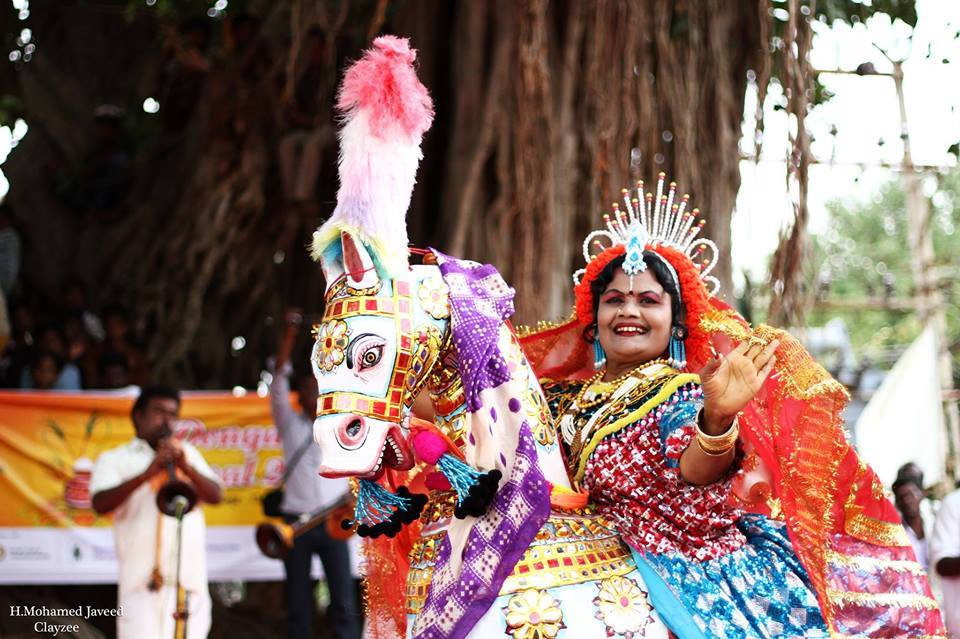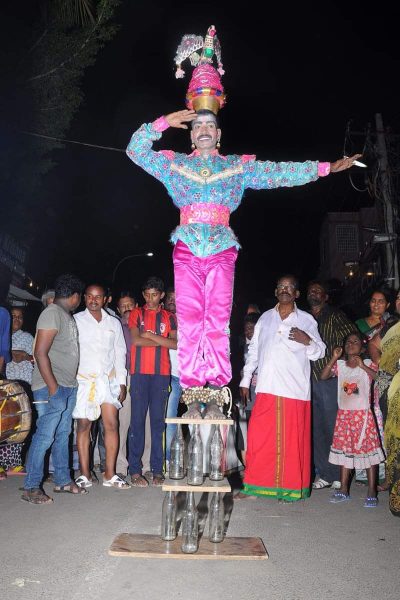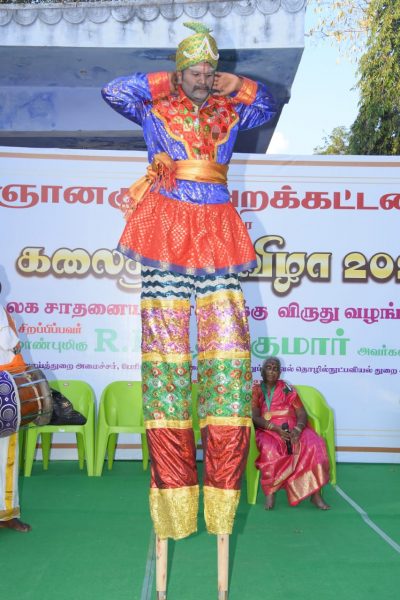
Raring for gigs, Tamil Nadu’s folk artists await revival of Chennai Sangamam

Thirty-eight-year-old R Karthik starts his work at 6 am every day with a heavy heart. One who used to be a folk artist barely months back now collects garbage at doorsteps and cleans roads in and around KK Nagar in Chennai. It has been four months since he took up the job at a monthly salary of ₹11,500. Despite the low income and distressful nature of the job, Karthik, the sole breadwinner in a family of five is not ready to quit, as he has to feed mouths, pay his pending dues and manage his family business. Born in a family of folk artists and having won the Tamil Nadu government’s Kalai Valarmani award for his contribution to folk arts, Karthik never thought he would give up the folk art forms of Karakattam, Poikkal Kuthirai Attam (dance forms) and Parai until recently.
“My heart aches every time I pick up a broom or collect garbage. But I have no other option to manage my family expenses. Having performed nowhere in the last two years since the COVID-19 pandemic hit the country, I absolutely had no source of income. I had borrowed in multiple instalments during this period to manage expenses and now it has summed up to ₹1 lakh. This job is helping me pay at least the rent,” he said.
Karthik learnt the arts from his father by accompanying him to functions and started performing since he turned 13 years. Until 2020, he had performed in multiple temple and government functions across the state.

“I used to perform in at least two to three functions every month apart from performing in a temple function every week. As we perform as a group, a person’s earning does not exceed more than ₹2,000 per function. Even though our income was less, I was pulling through. Because I was a professional folk artist and knew nothing other than that,” Karthik said.
He said that officials from the state education department had asked him to perform for students under the ‘Illam thedi kalvi’ scheme, but he refused. (Under the recently-launched scheme, the state government trains volunteers from several fields to engage students of Class 1 to 8 between 5-7 pm to reduce the learning gap created due to the closure of schools after the COVID-19 outbreak).
“They would pay us ₹750 per day for 38 days. But what will I do after that? How will I survive?” he said. Karthik now only performs on rare occasions.
Artists persevere to preserve art form
While some like Karthik and his relatives have taken up salaried jobs to run their families, several others like M Pandi from Madurai who perform folk dances like Poikal Kuthirai Attam (dummy horse dance) are waiting with a hope for the situation to change for the better.

“We have borrowed a huge sum in the last two years to manage our expenses due to lack of opportunities and struggled a lot. But I don’t want to quit. Because if we give up, the art form would die. It is our responsibility to pass it on to the next generation and keep it alive,” Pandi said.
Pandi who is also a recipient of the state government’s Kalai Valarmani award, started performing when he was 10 years old and has performed at numerous programmes including government functions, temple functions, political functions and wedding functions apart from teaching students at schools and colleges. He has taught over 5,000 students so far. He has even performed in multiple movies.
Chennai Sangamam, a democratic platform
Just like every other artist, Karthik and Pandi are also waiting for the state government’s interventions like reviving ‘Chennai Sangamam’ for the betterment of their livelihood. Chennai Sangamam, introduced during the previous DMK regime, is an annual week-long cultural festival that showcases Tamil folk art. The festival did not take place ever since the AIADMK returned to power in 2011. Following the requests from the folk artists, the government is now considering reviving the festival.
Pandi said, “The festival is a much better platform for us to perform and we get better exposure too. We not just get continuous work for seven days but also we get other opportunities through the contacts we make during the festival. This apart, the festival would also create awareness about folk arts among the public.”
Manimaran, founder of Buddhar Kalai Kuzhu said that the festival would not just stop with enhancing opportunities and providing livelihood for the artists; it actually is democratic platform that makes a lot of difference in the world of artists.
“The festival is one where all forms of arts, be it Parai or Bharatanatyam would be treated equally. This is a place where a where a Bharatanatyam dancer would perform to the beats of Parai. Not just that, as a large number of artists from several parts of the state gather together for the festival, it gives them a lot of scope for their betterment, strengthens the relationship between the artists, creates an avenue for innovation and limits their own restrictions. Creating a healthy competition, the festival creates a good impact on artists and the art,” he added.

